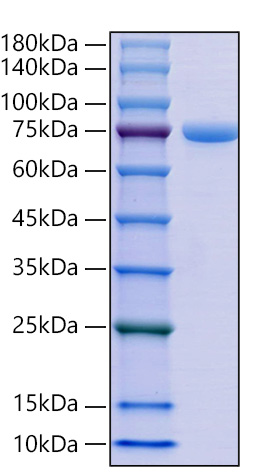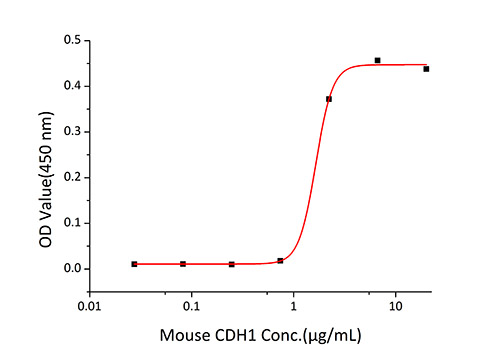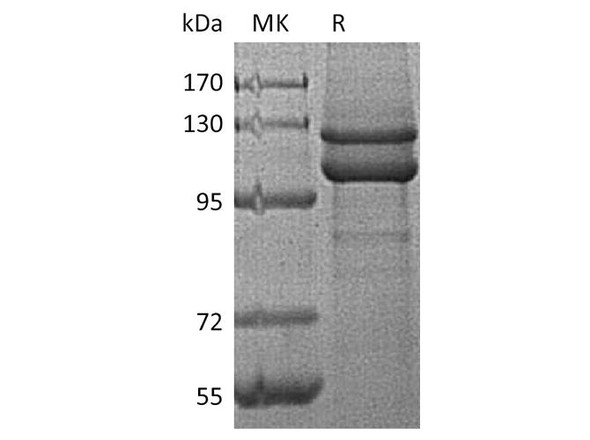Description
Recombinant Mouse E-Cadherin/CDH1/CD324 Protein
The Recombinant Mouse E-Cadherin/CDH1/CD324 Protein is a high-quality recombinant protein designed for murine biological research applications. This protein serves as an essential reagent in mouse model studies, comparative immunology research, and preclinical therapeutic evaluations, enabling scientists to investigate E-Cadherin/CDH1/CD324 biology and its relevance to human disease mechanisms through translational research approaches.
This product (SKU: RPCB1523) is produced using HEK293 cells and features a C-6His tag for convenient detection and purification. The protein exhibits a calculated molecular weight of 61.70 kDa with an observed molecular weight of 75 kDa under denaturing conditions, achieving ≥ 95 % as determined by SDS-PAGE.. Functional bioactivity has been validated through rigorous quality control assays, confirming its suitability for demanding research applications.
Key Features
| High Purity by Affinity Chromatography | |
| Mammalian & Bacterial Expression Systems | |
| High lot-to-lot consistency via strict QC |
| Product Name: | Recombinant Mouse E-Cadherin/CDH1/CD324 Protein |
| SKU: | RPCB1523 |
| Size: | 10 μg , 20 μg , 50 μg , 100 μg |
| Reactivity: | Mouse |
| Synonyms: | Um, UVO, Ecad, ARC-1, E-cad, L-CAM, CDH1 |
| Tag: | C-6His |
| Expression Host: | HEK293 cells |
| Calculated MW: | 61.70 kDa |
| Observed MW: | 75 kDa |
| Gene ID: | 12550 |
| Protein Description: | High quality, high purity and low endotoxin recombinant Recombinant Mouse E-Cadherin/CDH1/CD324 Protein (RPCB1523), tested reactivity in HEK293 cells and has been validated in SDS-PAGE.100% guaranteed. |
| Endotoxin: | < 0.1 EU/μg of the protein by LAL method. |
| Purity: | ≥ 95 % as determined by SDS-PAGE. |
| Formulation: | Lyophilized from a 0.22 μm filtered solution of PBS, pH 7.4. |
| Bio-Activity: | Measured by the ability of the immobilized protein to support the adhesion of the MCF-7 human breast cancer cells. The ED 50 for this effect is 0.82-3.29 μg/mL. |
| Reconstitution: | Centrifuge the vial before opening. Reconstitute to a concentration of 0.1-0.5 mg/mL in sterile distilled water. Avoid vortex or vigorously pipetting the protein. For long term storage, it is recommended to add a carrier protein or stablizer (e.g. 0.1% BSA, 5% HSA, 10% FBS or 5% Trehalose), and aliquot the reconstituted protein solution to minimize free-thaw cycles. |
| Storage: | Store at -20℃.Store the lyophilized protein at -20℃ to -80 ℃ up to 1 year from the date of receipt. After reconstitution, the protein solution is stable at -20℃ for 3 months, at 2-8℃ for up to 1 week. |
This protein is a member of the neurotrophic tyrosine kinase receptor (NTKR) family. This kinase is a membrane-bound receptor that, upon neurotrophin binding, phosphorylates itself and members of the MAPK pathway. The presence of this kinase leads to cell differentiation and may play a role in specifying sensory neuron subtypes. Mutations in this gene have been associated with congenital insensitivity to pain, anhidrosis, self-mutilating behavior, mental retardation and cancer. Alternate transcriptional splice variants of this gene have been found, but only three have been characterized to date.








